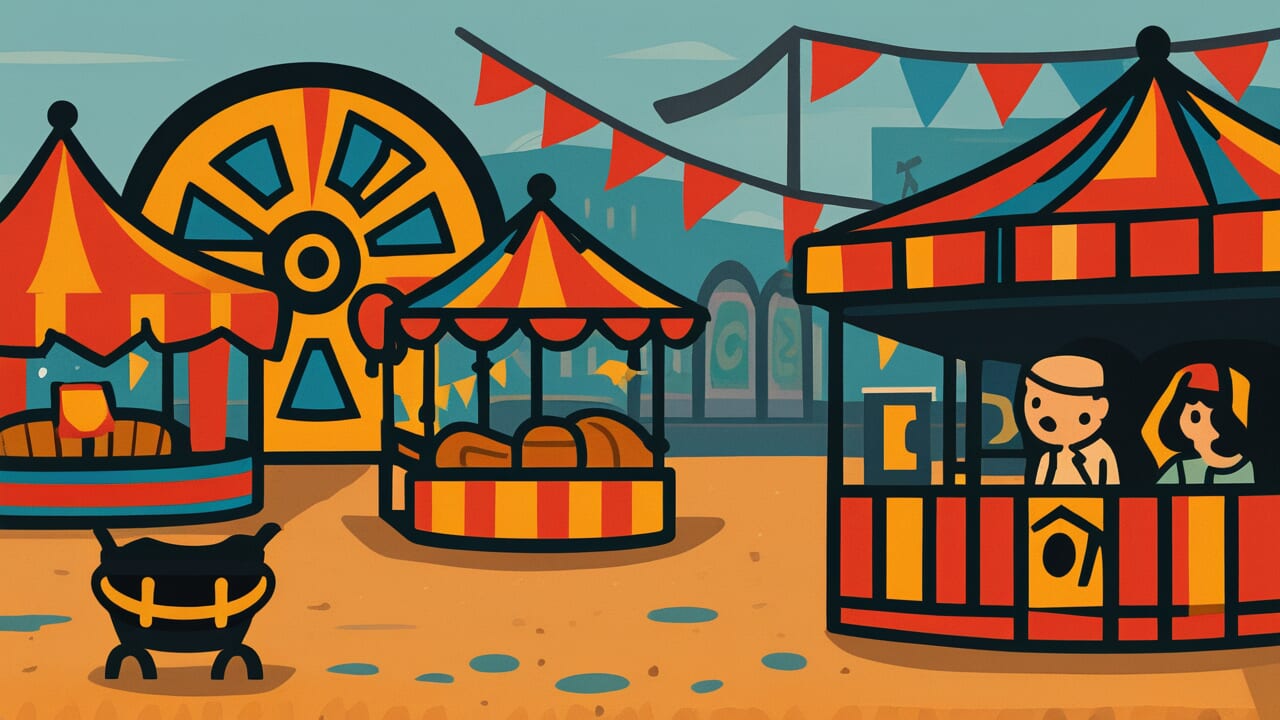How to Read “A day after the fair”
A day after the fair
[uh DAY AF-ter thuh FAIR]
All words are common and easy to pronounce.
Meaning of “A day after the fair”
Simply put, this proverb means you’ve arrived when everything good is already over and gone.
The phrase paints a clear picture. A fair is full of excitement, games, and treats. But the day after, it’s empty. The rides are gone. The food stalls are packed up. You missed everything. The proverb describes showing up when it’s too late to join in or benefit.
This applies to many real situations today. Someone hears about a job opening after it’s filled. A student tries to join a project after the team finished. An investor buys stock after prices already peaked. The opportunity existed, but the timing was wrong. Arriving late means missing out completely.
What makes this wisdom stick is how universal the feeling is. Everyone has experienced that sinking disappointment of being too late. The proverb captures that specific frustration perfectly. It reminds us that timing matters as much as interest or effort.
Origin and Etymology
The exact origin of this phrase is unknown. It appears in English language collections from the 1800s. The saying likely developed from rural community experiences with traveling fairs.
Fairs were major events in villages and small towns. They came once or twice a year at most. People planned for weeks to attend them. Missing a fair meant waiting months or a full year. The disappointment of arriving too late was genuinely significant. These events brought rare goods, entertainment, and social opportunities.
The phrase spread naturally through everyday speech. It described a feeling everyone understood immediately. As fairs remained important through the 19th century, the saying stayed relevant. Even as society changed, the core meaning translated easily. The image of an empty fairground remained powerful and clear.
Interesting Facts
The word “fair” comes from Latin “feria” meaning holiday or festival. Medieval fairs combined religious holidays with commerce and entertainment. They were crucial for trade before permanent shops became common. Many English towns still hold annual fairs dating back centuries. The timing of these events was strictly regulated and widely known.
Usage Examples
- Manager to employee: “You’re offering solutions now that the client has already left us – A day after the fair.”
- Coach to player: “You want to practice hard after we lost the championship game – A day after the fair.”
Universal Wisdom
This proverb touches something deep about how humans experience time and opportunity. We evolved in environments where resources appeared in specific windows. Fruit ripened at certain times. Animal migrations followed schedules. Missing these moments meant real hardship. Our ancestors survived by developing sharp awareness of timing.
The anxiety around being late runs deeper than simple disappointment. It connects to fundamental fears about scarcity and exclusion. When a group shares an experience without you, social bonds form that you’re outside of. When resources get claimed before you arrive, survival becomes harder. This proverb captures that ancient tension between individual timing and collective moments.
What makes this wisdom endure is the gap between knowing and doing. Everyone understands that timing matters. Yet people still procrastinate, hesitate, and delay. We tell ourselves there’s always tomorrow. We underestimate how quickly opportunities close. The proverb serves as a reminder that windows don’t stay open. It speaks to our tendency to assume time is more flexible than it actually is. The fair doesn’t wait, and neither does life.
When AI Hears This
The fair announces its date weeks ahead, but not everyone hears equally. Some families always know when opportunities arrive because they’re connected. Others learn too late because information travels through networks they can’t access. This isn’t about intelligence or effort. It’s about who gets told first and who has flexibility to respond. The timing itself becomes a filter that separates people.
This pattern repeats because opportunities genuinely need boundaries to function. A fair can’t stay open forever waiting for everyone. But humans unconsciously design these boundaries around their own circumstances. The people setting schedules have resources to arrive on time. They assume everyone else does too. What looks like fair rules actually favors whoever already has advantages. The system protects itself by calling latecomers lazy rather than excluded.
What strikes me is how invisible this mechanism remains to humans. Those who arrive on time believe they simply planned better. Those who arrive late often blame themselves for poor timing. Neither group sees the hidden architecture determining who could possibly succeed. Yet this filtering serves a purpose in resource-limited situations. Societies need ways to distribute scarce opportunities without endless conflict. The cruelty is that it works by appearing neutral when it never was.
Lessons for Today
Living with this wisdom means developing better awareness of opportunity windows. The challenge isn’t usually knowing that timing matters. It’s recognizing when a specific moment is actually closing. Many opportunities don’t announce their deadlines clearly. Learning to spot these closing windows takes practice and attention.
In relationships and collaboration, this wisdom cuts both ways. Sometimes you need to act before chances disappear. A friendship requires reaching out before too much distance grows. A partnership needs commitment before other options get chosen. But pushing too hard on timing can also backfire. Pressuring people with artificial urgency damages trust. The skill lies in distinguishing real deadlines from manufactured ones.
For groups and communities, this proverb highlights coordination challenges. When does a collective moment actually close? A neighborhood meeting happens whether you attend or not. A cultural shift moves forward without waiting. Yet communities also need to balance urgency with inclusion. Not everyone can move at the same speed. The wisdom here isn’t just about individual timing. It’s about recognizing which moments are truly irreversible and which can accommodate different paces. Missing the fair feels terrible, but sometimes another fair comes to town.



Comments